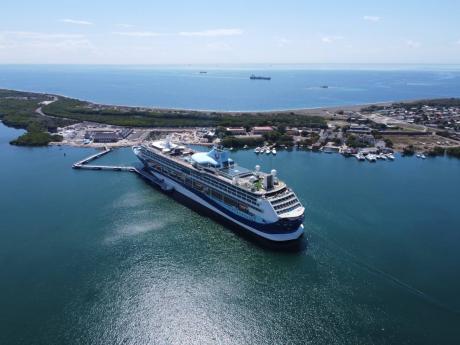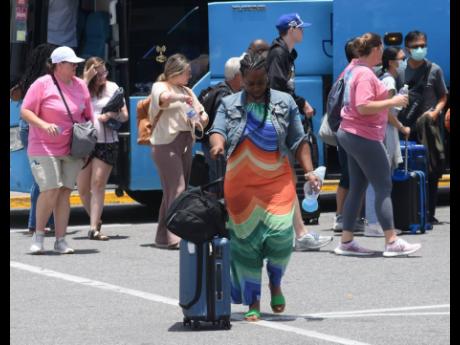Janice Allen | Tourism pie needs to be sliced to benefit all
Tourism has the potential to transform the lives of a significant number of Jamaicans because of its linkage to other industries. A responsible government works to ensure that policies are in place to facilitate real transformation.
Jamaica’s tourism industry has grown and is celebrated by many, but if we are not careful, we will see the larger players as the only beneficiaries, and much like the cannabis industry, we could see more micro and medium-sized Jamaican businesses being squeezed out of the picture and losing out on a slice of the glorious pie.
In 1955, the Jamaica Tourist Board was formed as the agency of government responsible for the promotion of tourism, heralding the birth of tourism in a formal way even though there had already been an established hotel industry, which began as a result of the hosting of the world’s fair of 1891 in Kingston. Notable hotels like the Myrtle Bank Hotel and the Constant Spring Hotel were built. In addition, there was the Queen’s Hotel downtown Kingston, but that was mainly marketed to ordinary Jamaicans of the peasant class – black Jamaicans from rural towns. For nearly seven decades, tourism has evolved into being a major source of foreign exchange for the government coffers, and as such, now holds pride of place in the minds of most Jamaicans.
As tourism expanded to the northwestern coast, there was the development of some notable hotels that have maintained their prestige. Hotels like the Jamaica Inn, which celebrates 70 years this year; the Half Moon; Round Hill, and others. Arising from the growth in the hotel sector, other subsectors emerged like transportation, craft, restaurants, and attractions. People had to move from the airport to a hotel. They desired local crafts to remind them of their visit, and they wanted to experience things they couldn’t elsewhere. These supporting sectors created businesses and job opportunities for ordinary Jamaicans, and even though tourism was seasonal (December to April), many were able to earn a decent living, and as the pie got larger, more Jamaican-owned businesses emerged, which led to tourism benefiting more than the owners of hotels.
EUROPEAN PLAN
The tourism product then was made up of mainly European Plan (EP) hotels –room only and all other services purchased. So in Montego Bay, for example, this created the rise of numerous restaurants that would buzz especially in the evenings as visitors would leave their hotel, using local transportation operated by individual taxi operators, who soon formed themselves into entities like JUTA (Jamaica Union of Travellers Association – 1974), to dine in and around Montego Bay. Craft markets were teeming with visitors seeking to take home a piece of Jamaica, and the owners of those shops were able to give their children hope for the future.
These are just some examples of what tourism should mean to any local economy, and if the industry is to grow and be protected by locals, they must enjoy the fullness of the benefits. EP hotels are well placed to have an impact on communities and the local economy because of the nature of that model. It provides opportunities for numerous subsectors to supply a multitude of demands – food, transportation, retail, entertainment, and others.
With growth comes evolution. As traveller needs grew and changed, the tourism product evolved, and in the late 1970s, the birth of the modern offering of all-inclusive began to make the travel journey and experience simplified for the visitor.
When it was first envisioned, it was never to replace what already existed, but to provide an option. It also provided a new opportunity for increased profits for the owners of hotels, who were able to put together attractive packages and make it easy for the visitor to pay and play. Pay one fee and everything is taken care of. With the advent of this type of vacation package, the types of investments in the industry had to change to meet said demand.
In the 1990 to 2000 period, the Government at the time realised that it needed direct foreign investment to significantly grow the room stock to position destination Jamaica as a real player in the global tourism market. The Government went about it by strategically building and gearing its policies towards this path. The results are there to be seen with chains like RIU, Secrets, Royalton, Palladium, and others. The current minister of tourism has continued that policy, which has proven to be beneficial. However, as beneficial as this growth has been, there have been casualties.
CAUSALITIES
For example, independent water sports operators with their glass-bottom boats are now at brink of shutting down their businesses as most hotels have their own watersports operations. As the industry grows, instead of seeing more opportunities for locals to enter the transportation business, we see increased vertical integration creating avenues for foreign companies to take market share from locally owned companies and keep the revenue overseas.
So the dollar amount per person spent and retrained in Jamaica is reduced every year. One of the biggest casualties of the evolution is craft. With the underdevelopment of craft and competition from many angles, including on-site shopping experiences, craft is no longer as viable or profitable. This means that the tourism dollar, which used to be seen and felt by small businesses, especially in rural communities, has been reduced. The onus now is on the Government to review its development policy to ensure that growth of the industry doesn’t mean the stifling of the micro business owners.
Where we are in tourism’s evolution requires a plan to specifically and deliberately design progressive government policies focused on building an industry that will be beneficial to the small and medium Jamaican business owner. Tourism must contribute in a meaningful way to the growth and wealth creation for more Jamaicans.
Tourism over the years was always the industry that provided the greatest opportunity for small businesses to flourish. It allowed the craft maker and trader to send her daughter to university, the JUTA driver to build his house, the water-sports operator to make a life bigger than he dreamed. The heights of these small business’ success was when the European Plan was the dominant offering as it created the demand for services, which were supplied by micro business operators.
All-inclusive hotel investments have done very well for Jamaica. They have led to significant increases in arrivals and earnings for the investor and the Government. All-inclusives have contributed significantly to the development of infrastructure, including roads, water supply, and housing and is part of the reason successive governments have boasted of continuous increases in investment in this area.
STRIKE A BALANCE
However, we must seek to strike a balance. While we welcome the much-needed foreign investment and appreciate what these investors need to have return on their investment, my concern is that many of these large investors are being so vertically integrated that they are claiming significantly more of the pie. We need a balance!
Of the 15,000 rooms listed on record by the Ministry of Tourism as “coming on stream”, 95 per cent are expected to be all-inclusive rooms. What will these 14,000 or so all-inclusive rooms mean for the local economy? Yes, people will be employed, goods and services used, but how many micro businesses will be birthed and flourish as a result? It is now time for Jamaica to review its policy on tourism investment and development that will strike a balance that will better enable smaller Jamaican entrepreneurs to get a piece of the pie.
Let’s not just talk about it. Let’s seek to make some bold decisions on behalf of the Jamaican people.
Janice Allen is a senator and opposition spokesperson on tourism and linkages. Send feedback to columns@gleanerjm.com.



